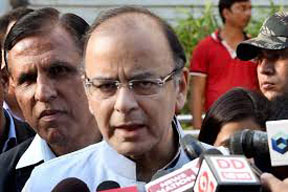 NEW DELHI: Setting at rest the controversy with regard to regulation of government bonds for the time being, Finance Minister Arun Jaitley Thursday dropped from the Finance Bill 2015 the proposal to set up a separate Public Debt Management Agency (PDMA), outside of the Reserve Bank of India’s ambit.
NEW DELHI: Setting at rest the controversy with regard to regulation of government bonds for the time being, Finance Minister Arun Jaitley Thursday dropped from the Finance Bill 2015 the proposal to set up a separate Public Debt Management Agency (PDMA), outside of the Reserve Bank of India’s ambit.
The minister said however that the government, in consultation with the Reserve Bank, will prepare a roadmap to pursue a separate debt management agency later in line with the global practice.
“Since the RBI has been handling public debt management, the government in consultation with the RBI will prepare a detailed roadmap separating the debt management function and the market infrastructure from the RBI and having a unified financial market,” Jaitley said.
He made these remarks while initiating the debate on the Finance Bill in the Lok Sabha. The House is expected to approve the Bill later in the day, giving effect to the tax proposals.
The Budget 2015-16 proposal to set up PDMA and shift the regulation of government bonds from RBI to market regulator Securities and Exchange Board of India (SEBI) generated lot of controversy, with the central bank raising concerns and questioning the timing of the move.
“It is…being decided to delete the PDMA provisions from the Finance Bill for this financial year,” Jaitley said.
“This government is committed to unifying the financial market both by making the government securities part of this market as well as creating a proper bond currency derivate market,” he added. . “There are six different provisions which we are omitting,” Jaitley said while referring to the provisions in the Finance Bill for PDMA and regulation of government bonds.
Eventually, the government in consultation with the RBI will work out a scheme for a separate debt management agency in line with the global practice.
“Having an independent debt management office is also the best international practice in countries like US and UK neither public debt is managed by central bank nor is regulation of GSec, Currency and Derivative with the central bank,” he said.
The continuation of RBI as a debt manager of the government limits the liquidity and fragments the functioning of bond market, Jaitley said.
The existing structure also creates a conflict of interest as the RBI has to perform the twin role of controlling inflation and keeping the cost of government borrowing low.
Jaitley added that it also perpetuates the conflict of interest with the RBI from being a regulator of Government securities and simultaneously being both a trader in government securities.
As regards capital market regulator Sebi, he emphasized it neither owns a stock exchange or a depository nor does it trade in bonds.
Another conflict of interest for RBI is that it forces the banks to invest in government securities through the instrument of Statutory Liquidity ratio.
The proposals of a separate management of government debt from RBI was first mooted by the RBI itself in annual report 2000-01.
Subsequently several independent committees have recommended the establishment of an independent Debt Management Agency, equi-distant both from the government and the RBI.
“The Persi Mistry report of 2007, the Raghuram Rajan Committee report of 2009 have both strongly argued for separating the debt management functions from the RBI. The recommendations are well founded,” Jaitley said.–PTI






